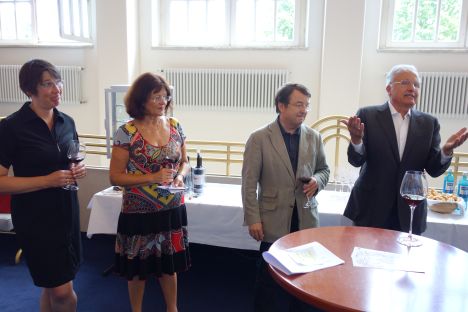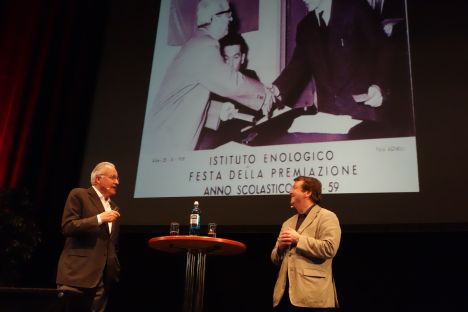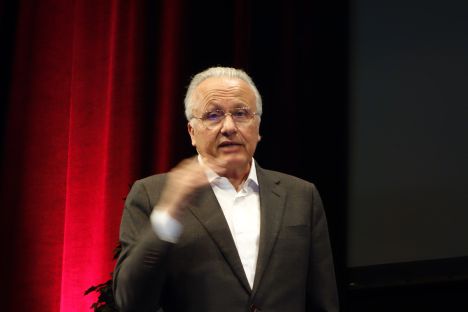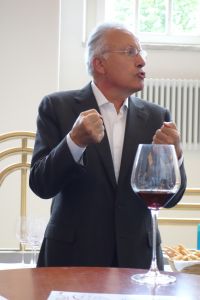Angelo Gaja, winemaking legend from the Italian wine region of Piedmont, came to the Palatinate on 6 and 7 July 2014 to give a lecture on "The History of Wine" in Neustadt an der Weinstraße and to present his wines at the "Véritable 14" wine trade fair in St. Martin. The "Véritable" organisers Uwe Warnecke (former sommelier at the Deidesheimer Hof hotel and restaurant) and Philipp Kiefer from the Aloisiushof wine and sparkling wine house as well as the Pfalzwein regional wine promotion had invited him. The visit also took place against the background of the tourism cooperation between the Palatinate wine-growing towns of Deidesheim and Neustadt an der Weinstraße with the Langhe-Roero region in Piedmont.
Gaja, born in 1940, is the great-grandson of Giovanni Gaja, who founded the family winery in Barbaresco in 1859. He joined the business in 1961 at the age of 21, after studying viticulture in Alba and Montpellier and economics in Turin. In 1970, he hired the oenologist Guido Rivella, who is still responsible for the wines from the Gaja house today. Angelo Gaja is considered a pioneer in the introduction of malocatic fermentation, the use of barrique barrels and the planting of French grape varieties in Piedmont. He achieved world fame with Barolo, Barbaresco and Super Tuscans and was awarded numerous prizes and honours. The Gaja winery currently cultivates around 100 hectares of vines in Piedmont and over 130 hectares in Tuscany.
 |
| On 6 July in the Saalbau in Neustadt/Weinstraße (from right to left): Winegrowing legend Angelo Gaja; Willi Klinger% Managing Director of Österreich Wein Marketing (ÖWM) and translator at the lecture event; Theresia Riedmaier% District Administrator of the Südliche Weinstraße district; Dagmar Loer% Managing Director of Tourist% Kongress und Saalbau GmbH in Neustadt an der Weinstraße. (Photo: neustadt.eu) |
The name Gaja has its origins in Spanish and came to Piedmont when in the 18th century - as Angelo Gaja described it - a Spaniard married a woman from the village of Barbaresco. Angelo stands for the fourth generation of the family, and the first-born sons of the Gajas have always been called Giovanni and Angelo in turn since the founding of the winery; Angelo's son is therefore called Giovanni again, like his father and great-grandfather.
"People need respect for the developments and the past. You have to understand history to be successful," says the cult winemaker. He says it is about safeguarding life experience for the next generation and passing it on. "The past has its value, but it doesn't explain everything in the future. The modern age of wine dawned 40, 50 years ago," Gaja explained. This modernity was characterised by clarity: by cleaner and more precise wines, not least due to better cellar hygiene. On the one hand, technical progress produces pleasing wines that come from large wineries and are immediately accessible to the consumer. On the other hand, terroir wines are created in which the geographical conditions are transferred to the wine. "Terroir wines are not oriented towards consumer taste, but towards their origin and the mentality of the producer," says Gaja. They are produced by artisanal wineries, the artigiani. "All wine producers are important - the winegrowers, the cooperatives, the large wineries - but the artigiani are special!" These artisanal winemakers are important protagonists - according to Gaja, "crazy people who believe in a dream". They drive wine quality forward, progress is only possible with them.
 |
| Angelo Gaja (left) with ÖWM head and translator Willi Klinger during his lecture. "The vineyards in the Langhe-Roero and Monferrato regions are recognised% as Unesco World Heritage Sites, and from this comes the obligation% to preserve this unique% valuable landscape. This is a big challenge% because at the same time the increasing tourism can endanger the ecosystem"% warned the star winemaker. (Photo: neustadt.eu) |
Gaja referred to the situation in the communist states after the Second World War: "In today's Georgia or Moldova, for example, wine was produced in collective farms according to the guidelines of the planned economy and sold in supermarkets in Moscow. Both wine production and wine sales were political processes," Gaja emphasised. For artisanal winemakers, who had their own visions, such a thing was impossible, he said. "Under communism there was no freedom and therefore no good quality wine."
In the crisis, he said, the economy (and also the wine industry) relies on innovation, research and technology. "These elements are important for progress, but one must not forget manual labour. In wine production and tourism, human labour is the most important factor for quality, so we need to emphasise more the value of manual labour," Gaja urged. "Agriculture is an important, large reservoir of skilled labour, and wineries are perfect for integration into the system. They aim to sell their wine in bottles, but if that's not possible, sell it in barrels to traders."
Italy has a great wealth of regional grape varieties, he said, and this "place-based identity" needs to be cultivated. "Not every wine has to be perfect all the time. Nature does not know perfection," Gaja explained. "If someone presents you with a perfect wine, I would be very sceptical if I were you! Small imperfections are allowed to remain; these are the peculiarities of wine, and artisanal winemakers appreciate them."
 |
| "If you want to be successful% you have to study European wine culture - you have to travel"% Gaja told the audience. More than 400 guests attended his lecture. (Photo: neustadt.eu) |
Gaja sees himself as an Artigiano and told of his grandmother Clotilde Rey (1880-1961), who brought him to this self-image. He was not yet ten years old when she asked him what he wanted to be in life. After he didn't know the answer, she told him: "You have to become an artigiano!
Four steps were necessary for this:
"You have to tell stories about wine and you should teach that," Gaja said. "The winemakers have to learn to tell their wines - not just give technical facts, but include the history of the region and the family and also their own dreams. It's about emotional messages. The narrative must arouse curiosity about the wine." He suggested offering "storytelling courses" to support small, artisanal winemakers, because they face many formal obstacles in Italy, he said. Supporting the small winemakers also helps their region, he said. "Artisanal winemakers are the best storytellers," Gaja said.
He named other people who had inspired him and were role models for him - also as examples of those "crazy" artisanal winegrowers who had each persevered to realise their own dream: Edoardo Valentini (1934-2006), the "father" of Trebbiano d'Abruzzo, Mario Incisa della Rocchetta (1899-1983), the creator of Sassicaia, Ferruccio Biondi Santi (1849-1917), the "inventor" of Brunello di Montalcino, and Aldo Conterno (1931-2012), who was famous for his Barolo and - according to Gaja - coined the saying in view of the slump in sales after the global financial crisis in 2008: "Now not even those who don't pay anyway are buying."
 |
| Three wines from the house of Gaja could be tasted in Neustadt: Promis 2009% Magari 2010 and Sito Moresco 2011. Angelo Gaja commented on the wines. (Photo: neustadt.eu) |
He was also influenced by his father Giovanni (1908-2002), said Gaja. He was convinced that there is no quality "without commitment, suffering and sacrifice". "Out of ten vintages, three or four are of poor quality. In these vintages, my father preferred to sell the wines openly rather than bottling them, in order to preserve the dignity of their origin. A wine can only bear the name of origin if its quality is worth it." Giovanni Gaja also coined the phrase: "He who knows how to drink knows how to live". With this maxim, his father introduced him to wine at a very early age - against his grandmother's will, Angelo revealed. The family had to teach the offspring how to enjoy wine responsibly, he said.
"I want to be a craftsman," Gaja confessed and also addressed the issue of sustainability and ecology. His wineries produce 50 tonnes of compost annually themselves: "Red worms from California transform manure from dairy cows into the best humus within a year. We then spread it in the vineyards to revitalise the soil." In his early 70s, Gaja sees two duties for himself towards his children: "Firstly, I want to be a good role model. I want to set many good examples for the next generation, but without the compulsion that they have to do it the same way I did. The children should be able to do what they want." On the other hand, he says, it is about passing on passion: "I want my children to be passionate about their work - just like me - I want them to want to achieve something. Passion at work is like a windscreen wiper: it doesn't stop it raining, but you can drive in bad weather."
In conclusion, Gaja once again explicitly encouraged all independent winegrowers and also the quality-conscious traders and customers: "What matters is not perfect wines, but original wines that also reflect the identity of the producer. The markets are not only there for large industrial wineries - individuality has chances!"